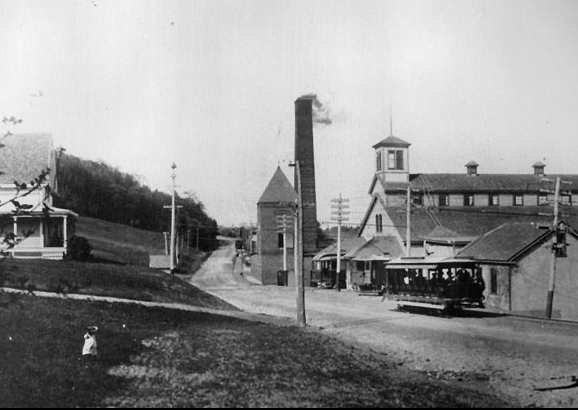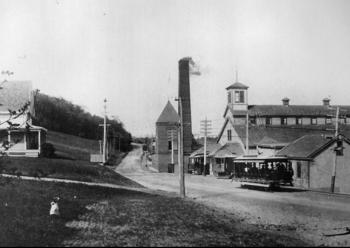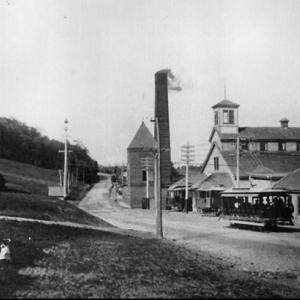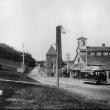Midcoast public transit discussions, June 24, in Rockland; June 25, Camden
 At Power House Hill, at Glen Cove in Rockport, where the Rockland Thomaston and Camden Street Railway Car Barn sat, servicing electric trolleys that ran along what is now Route 1 from Camden to Rockport to Rockland, Thomaston and Warren. Power was generated at Power House Hill to keep the trolleys going on 21 miles of track. Service began in 1892 and ran for 29 years.
At Power House Hill, at Glen Cove in Rockport, where the Rockland Thomaston and Camden Street Railway Car Barn sat, servicing electric trolleys that ran along what is now Route 1 from Camden to Rockport to Rockland, Thomaston and Warren. Power was generated at Power House Hill to keep the trolleys going on 21 miles of track. Service began in 1892 and ran for 29 years.
 At Power House Hill, at Glen Cove in Rockport, where the Rockland Thomaston and Camden Street Railway Car Barn sat, servicing electric trolleys that ran along what is now Route 1 from Camden to Rockport to Rockland, Thomaston and Warren. Power was generated at Power House Hill to keep the trolleys going on 21 miles of track. Service began in 1892 and ran for 29 years.
At Power House Hill, at Glen Cove in Rockport, where the Rockland Thomaston and Camden Street Railway Car Barn sat, servicing electric trolleys that ran along what is now Route 1 from Camden to Rockport to Rockland, Thomaston and Warren. Power was generated at Power House Hill to keep the trolleys going on 21 miles of track. Service began in 1892 and ran for 29 years.
ROCKLAND and CAMDEN — The public is invited to hear consultants present findings on potential Midcoast transit, first in Rockland on Monday, June 24, and then Tuesday evening, June 25, in Camden. The sessions will provide information about a study conducted by the Midcoast Transit Committee and Nelson/Nygaard consultants. The study incorporated an online consumer survey, employer survey, data received from area transportation providers and research based on regional and national data. The meeting will include breakout groups so residents can help refine information.
The meetings take place June 24 at the Rockland Public Library Community Room and June 25 in the Washington Street Conference Room at the Camden Opera House. Both meetings begin at 6:30 p.m. and citizens are encouraged to attend.
"The reality of a daily transit system could exist for our Midcoast area, Camden to Thomaston," said Don White, chairman of the Midcoast Transit Committee, in a news release. "These two public sessions will give residents and businesses an opportunity to weigh in on the study's findings to date."
The Maine Department of Transportation recognizes a value in such a transit system. The 2013-2014-2015 DOT Work Plan has included a proposed expenditure of $600,000 to purchase buses for a new service running from Thomaston to Rockland, Rockport and Camden. The plan also includes allocating $250,000 annually for three years for operating expenses, representing a federal transfer of funding. The DOT's work plan carries a $1.8 billion price tag, and of that, $157.8 million targets multimodal capital projects with another $89 million for multimodal operational funding.
Related story
Get on the bus: Ambitious study of regional possibilities begins. Midcoast Transit Committee hires California consultant
Daily bus service ended in the Midcoast area in the late 1950s and attempts at seasonal daily transit have been short lived since then, according to the committee. However, during the past several years, localized daily transit systems have met with success in the Bar Harbor area, Augusta, York County, Bethel Area and in the Sugarloaf area. Some of these systems are seasonal.
In the last century, there were trains (electric) and buses that ran along the coast on a regular basis, transportating people from homes to jobs and stores. In 1932, the Tolman Bus Service began, with runs on the hour between Camden and Thomaston, providing a way for the local population to move about the region. Those services faded away with the rise of the automobile. Now, it is Coastal Transportation, a subsidiary of the nonprofit MCH, that provides non-emergency transportation in this area, for the elderly, those with disabilities, and those with low income around Knox, Lincoln, and Sagadahoc counties.
"We'll be talking about the details around the economics and ridership needs for putting together a successful transit system in a rural area," said Carol Morris, public outreach consultant for the study. "We think that will be of interest to people who are serious about transit here. There has already been an astounding response to the online survey, and so we are looking forward to good turnout and lively discussion at both these meetings."
The online survey about travel habits relating to a transit service is available on each of the four communities websites and at www.midcoastplanning.org in transit study section. White noted that, "a daily transit service might help families with no car or those with one car. It might help students getting around after school, and in the summer help visitors more easily get around our four town area."
The Midcoast Transit Committee, consisting of interested citizens from towns along a corridor from Camden to Thomaston, announced Feb. 6 that it hired Nelson/Nygaard Consulting Associates, Inc., of San Francisco, to conduct a $60,000, 11-month feasibility study of a daily transit system here.
The committee circulated a request for study proposals last year, and Nelson/Nygaard was one of the firms responding.
The transit study is funded by Maine Department of Transportation, Coastal Transportation, and local matching contributions of $1,650 each from Camden, Rockport, Rockland and Thomaston.
The roots of the Midcoast Transit Committee extend back to an Oct. 4, 2011 a discussion at the Rockland Public Library, when public transit advocate Tim Sullivan and Lee Karker of Coastal Transportation raised the idea of bus service. Also attending that meeting were representatives from Friends of Midcoast Maine, Penquis, Pen Bay Healthcare, Gateway 1, and local politicians. They all began to meeting monthly, and a committee was subsequently born on the recognition that public transportation could successfully accommodate a diverse market of users. The committee now comprises two delegates from each of the four involved communities, as well as other interested parties.
At the initial meeting, a list of potentially interested riders were identified and included the elderly, workers, tourists, shoppers, youth with licenses, and environmentalists seeking a smaller carbon footprint.
More than a decade ago, Camden experimented briefly with a summer bus service that looped from points to the north and south of the town line to the downtown, in an attempt to alleviate downtown parking and traffic pressures. But the experiment failed, and the buses were sold to the Island Explorer on Mount Desert.
In its proposal, Nelson/Nygaard said the public process would include, “ensuring broad-based involvement in the study process, engaginga variety of interests and stakeholders including employers, human service providers, seniors, advocates for disabled etc. and provide meaningful opportunities for involvement and input during the planning process.”
Editorial Director Lynda Clancy can be reached at lyndaclancy@penbaypilot.com; 706-6657
Event Date
Address
United States



























